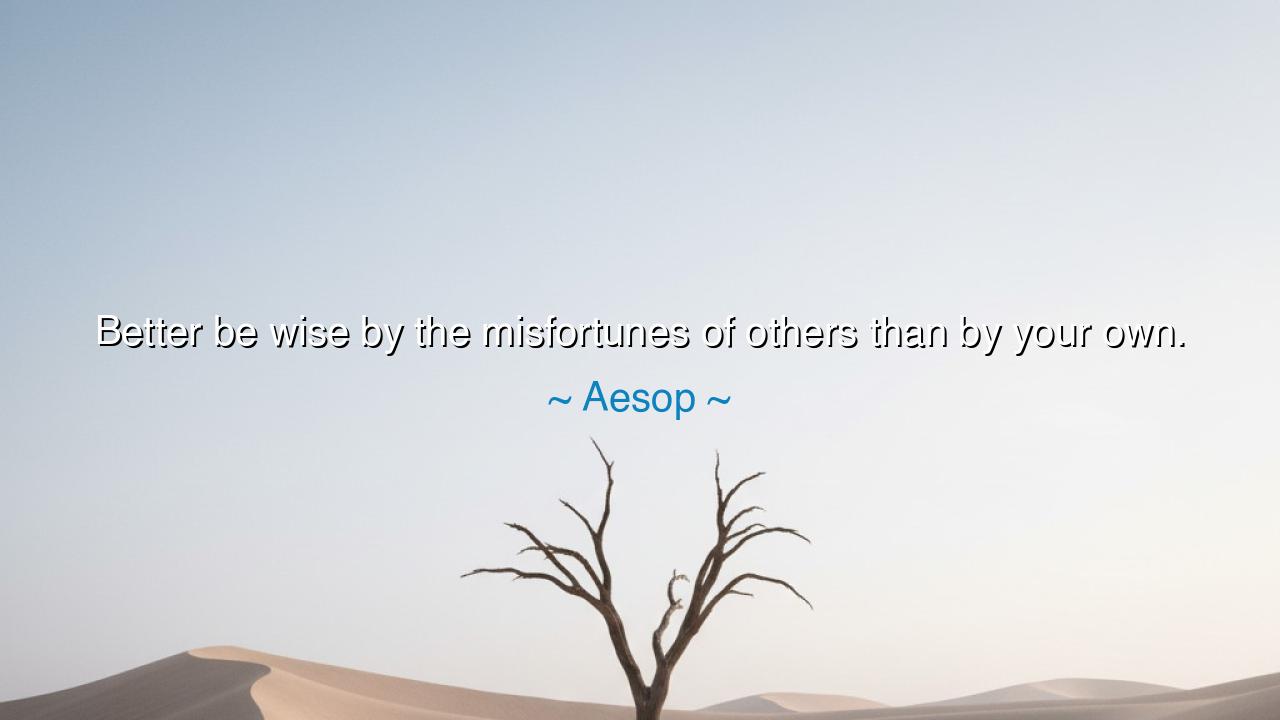
Better be wise by the misfortunes of others than by your own.






O Seekers of Wisdom, hear the words of Aesop, who speaks with the voice of ages: "Better be wise by the misfortunes of others than by your own." In this profound truth, Aesop reminds us that wisdom does not always have to be gained through personal suffering and loss. Experience is a great teacher, but it is far wiser to learn from the failures and misfortunes of those who have come before us. It is through observing the struggles of others that we can avoid the same pitfalls, saving ourselves from unnecessary pain and hardship. Wisdom born of others' mistakes is the most cherished kind, for it is the ability to learn without the heavy price of personal suffering.
Consider, O Children, that the path of wisdom is not always one of trial and tribulation. To walk this path does not mean we must bear every burden ourselves, for there is great value in watching others and reflecting upon their journeys. The world is full of misfortune, and it is through the stories of others—their triumphs, their failures, their losses—that we are given the lessons we need to navigate our own lives. To be wise is not merely to endure, but to understand the experiences of others and apply their lessons to our own path.
Look to the tale of the great conqueror Napoleon Bonaparte, whose rise to power was swift, but whose fall was equally as dramatic. His ambition led him to stretch his empire across Europe, but he ignored the lessons of the past, repeating the same mistakes others had made before him. Napoleon's misfortune—his failed invasion of Russia—served as a harsh reminder to the world of the dangers of overreaching. Those who were able to learn from his errors, who recognized the dangers of unchecked ambition, found themselves wiser than those who followed blindly in his footsteps. In this way, they were able to avoid his fate.
And so, O Seekers of Truth, let us learn from the misfortunes of others, that we may avoid the suffering and hardship that comes from ignorance. The wise are not those who stumble blindly into misfortune, but those who open their eyes to the experiences of others and allow these lessons to shape their own choices. We are not meant to repeat every mistake of those who came before us; instead, we are meant to build upon their wisdom, growing stronger and wiser without the weight of personal tragedy.
Let us, therefore, seek to see with clarity and to listen to the stories of others, that we may avoid the pitfalls of life. True wisdom comes not only from the pain we endure, but from the ability to learn from the struggles of those who have walked the path before us. The greatest strength lies in heeding the warnings of others, for it is through understanding their misfortunes that we protect ourselves from the same fate. The wise are those who walk not with blind steps, but with eyes open to the lessons of the world.






LT43-8.1 Lam truong
This quote feels like a reminder of how we often overlook the wisdom that comes from observing others' struggles. But is it always possible to learn from others' misfortunes, especially if those people are too close to us emotionally? Can we be objective enough to learn from their mistakes, or do we need to distance ourselves to truly see the lessons they offer? It makes me wonder about the fine line between empathy and practical wisdom.
CDNguyen Cong Danh
I love the idea of learning from the misfortunes of others, but I wonder if this advice can sometimes lead to a fear of taking risks. If we’re constantly trying to avoid the mistakes others made, can it hold us back from growth or new experiences? Is there a balance between learning from others and embracing the lessons that come from our own mistakes? It seems like it might be hard to find that line.
DDTien Dat Doan
It seems like Aesop is encouraging us to be more observant and learn from the mistakes of others, but isn’t it difficult to truly understand another person’s misfortunes without experiencing them ourselves? It’s one thing to hear about someone’s downfall, but quite another to grasp the emotional and practical consequences of it. Could the advice be more about developing empathy, or is it strictly a pragmatic approach to avoiding pitfalls?
PLPhong Le
This quote really makes me think about how often we ignore the lessons that others’ mistakes can teach us. It’s easy to think that we can only truly learn from our own experiences, but is that always the case? I wonder if people tend to dismiss the warning signs from others because they feel they’re different or won’t make the same mistakes. Do you think it’s always possible to avoid the same misfortunes by learning from others, or is personal experience necessary?